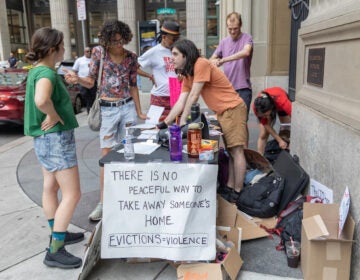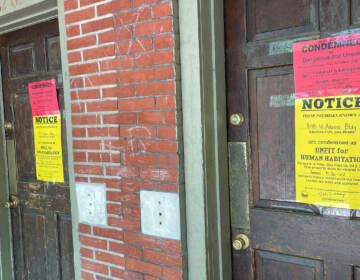Philly eviction contractors may need licenses to perform lockouts
These private security hires currently do not need any special training to work.
Listen 1:12
The Philadelphia skyline is pictured in a file photo. (Danya Henninger/Billy Penn)
Have a question about Philly’s neighborhoods or the systems that shape them? PlanPhilly reporters want to hear from you! Ask us a question or send us a story idea you think we should cover.
City Councilmember Kendra Brooks will introduce legislation on Thursday requiring private security contractors with the Landlord and Tenant Office to be licensed by the city.
Under the “Angel Davis Eviction Accountability Bill,” these armed contractors will, for the first time, have to complete training to serve the for-profit entity that performs the majority of evictions in the city.
“It is our responsibility as members of City Council to step up to protect the people from the violence of our current system,” said Brooks.
The office came under fire last year following a string of high-profile shootings by deputy landlord-tenant officers. Two of the incidents landed tenants in the hospital, including 36-year-old Angel Davis, who was shot in the head in March during an attempted lockout at a North Philadelphia apartment complex. She was hospitalized in critical condition, but survived the incident.
The shootings led to renewed calls from elected officials and housing advocates to reform the LTO amid a deepening affordable housing crisis. Brooks’ bill is the first legislative effort at the city level.
“Hopefully, no one will have to experience the trauma I have experienced going through the eviction process,” said Davis. “Hopefully the laws of eviction will be changed everywhere in the United States, starting in Philadelphia first.”
If passed, LTO contractors must complete 189 hours of training to become licensed and perform court-ordered lockouts. By comparison, the Philadelphia Sheriff’s Office, the only other entity in the city that conducts evictions, requires its deputies to complete 800 hours of training.
The bill requires training in subjects like:
- Cultural diversity
- Ethics
- Firearm basics
- Crisis intervention
- First Aid
- Dangerous dogs
“Setting standards in these areas promotes the safety and well-being of everyone involved in evictions. It builds public trust in our businesses and our government,” said City Councilmember Jamie Gauthier, who chairs the body’s Committee on Housing, Neighborhood Development, and the Homeless.
The measure, which Brooks will introduce during the first regular stated meeting of the new session, includes a six-month compliance period before licenses will be required. Under the bill, contractors will be prohibited from renewing their license if they were involved in a violent incident or used force during an eviction in the year prior to reapplying.
Additionally, deputies will also be required to have liability insurance and display their license when performing lockouts.
A spokesperson for the Landlord and Tenant Office declined to comment.
HAPCO Philadelphia President Gregory Wertman said his organization, the city’s largest advocacy group for landlords, doesn’t oppose the bill in principle. But he’s concerned the measure could translate to evictions taking longer to complete. The process currently takes about six months from start to finish — far too long in Wertman’s opinion.
“They are driving small landlords out of business, and it’s by design. There’s not even a doubt about it,” said Wertman, adding that he’d prefer that the courts determine what changes are needed regarding how lockouts are conducted in Philadelphia.
A majority of Council is backing Brooks’ bill. It comes roughly six months after the Landlord and Tenant Office resumed operations with new procedures and protocols for performing evictions. For example, landlords are now required to submit a safety affidavit before scheduling an eviction. Additionally, tenants can now find out the date and time of their lockout if they call the office.
In July, Marisa Shuter, Philadelphia’s landlord-tenant officer, agreed to temporarily stop performing evictions after a deputy landlord-tenant officer allegedly shot a 33-year-old Latese Bethea in the right leg during a lockout in Kensington. It was the third time in four months that a landlord officer had fired a gun on the job.
Bethea and Davis are each suing the LTO for negligence.
A package of bills introduced in Harrisburg also seeks to change how the LTO operates. The measures call for providing the date and time of lockouts, “stringent” guidelines and procedures for conducting them, and a way to give the public access to the names of deputy landlord-tenant officers involved in evictions where tenants are hurt.
Lawmakers also want to establish an independent advisory board to oversee the LTO and field and investigate alleged misconduct lodged against landlords. Additionally, they hope to make it a requirement that a mental health professional be on site whenever a lockout is in progress.
A separate measure would bar private attorneys like Shuter from carrying out evictions.

Subscribe to PlanPhilly
WHYY is your source for fact-based, in-depth journalism and information. As a nonprofit organization, we rely on financial support from readers like you. Please give today.








